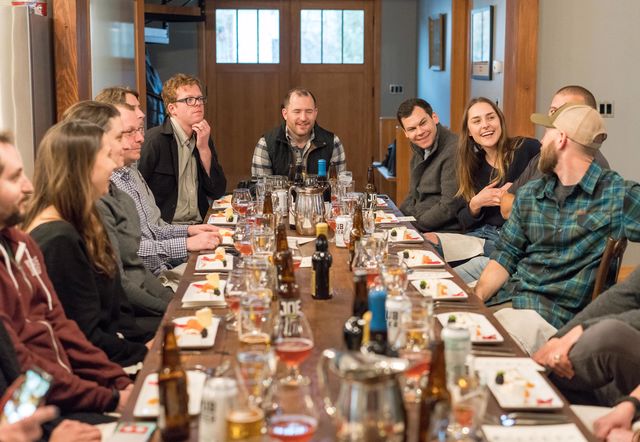
In my last post, where I introduced the idea of questing as a spiritual practice, I shared part of the vision statement for the First Christian Church in Norman, Oklahoma, where I had the privilege of serving for almost 18 years.
We are a community joined together in a reverent, thoughtful, loving quest for faith.
I have been reflecting on these words the last few days. It speaks of a community joined together. Questing can be a solitary endeavor. It can be something we do for ourselves. We seek personal meaning or a personal identity. We seek personal development or personal fulfillment.
From a Christian perspective, questing is always communal. You do not have a personal identity. Our identities are a self-in-relation. You do not set out on your own personal quest. You are joining a quest that has been going on for thousands of years. We walk with others, and they contribute to our journey. We walk with others, and we contribute to their journey.
It is not just a reverent, thoughtful or loving faith; it is a reverent, thoughtful, and loving quest for faith. This can mean a couple of things. One, we are not just ambling along. There is a focus and an intent to our journey. Every simple task or activity can have meaning because it is part of to the quest.

Two, faith is not something that you have or possess. From the perspective of questing, there is a difference between faith and belief. I can believe doctrines and propositions…I can believe them deeply. Faith, however, is about actively trusting. It is a way of being, a way of living, that you are always seeking.
Poet Maya Angelou often spoke of how, at times, she hesitated to call herself a Christian. In an interview on the occasion of being awarded the Presidential Medal of Freedom, she put it this way: “I’m always amazed people walk up to me and say, ‘I’m a Christian.’ I think, ‘Already? You already got it?’ I’m working at it, which means that I try to be as kind and fair and generous and respectful and courteous to every human being.”
In my previous post, I spoke of how questing as a spiritual practice can involve a particular journey or action that you are taking, like going on a pilgrimage to a religious or spiritual site. But there are ways that questing can be an image we use to shape the journey of faith that makes up our everyday living. What are some ways that we can weave questing into the rhythm and movement of our lives?
One of the ways that questing can shape our everyday living is to picture everyday activities as a quest. Benedictine spirituality talks about how work is also a prayer. From a questing perspective, we are not just completing items on our to-do list. Every simple task is doing the work of God in the world. And so, when we look for the presence of God in any activity, we are questing.
Several years ago, I saw a comedy skit which involved two people acting like sports announcers. One was a play-by-play announcer, the other provided color commentary. But instead of a grand sporting event in a packed arena, these men were announcing and giving commentary on people doing everyday tasks: washing the dishes, driving the children to school.

Pick any activity that is on your to-do list for today. As you read it, most likely, in your mind you are already picturing how it will unfold. But what if the task of going to the grocery store becomes the quest of going to the grocery store. Instead of saying to yourself, “Let’s get this done so I can check it off my list,” you said, “Let’s go forth and see what adventure is waiting for me. What will happen? What will I discover? What will I learn?”
In order to be on a quest, you have to give up the attitude of certainty.
Part of a quest is asking questions about what is happening inside of us, about what is happening in the world. In a recent blog post on the website for my counseling practice, I wrote an article about being a curious partner (https://www.counselingandmediationok.com/blog/3-ways-to-be-a-curious-partner). I spoke of how being curious about the other can keep deepen the connection with our partner.
We can adopt this curious, not-knowing stance with anything in our lives. You can learn to look at anything with a beginner’s mind. A beginner’s mind is a mindfulness practice where you intentionally experience something familiar as if you are encountering it for the first time. When you experience something for the first time, there is a sense of novelty and excitement. But when it is something that happens over and over, it becomes a part of the rhythm and routine of your life.
Look up and let your eyes fall on something in the room. It has been there for so long that this may be the first time in a while that you have noticed it. Look at it with a beginner’s mind, like it is a treasure you have just discovered. Ask the object as many questions as you can. How does the object answer? You can do the same thing with the image of someone dear to you, or someone you do not like. This is the quest of getting to know them in a way you haven’t before.

If you have a trip planned in the future, begin to think about it as a quest. Before you leave, write down what you are anticipating. This is not making a plan or an itinerary. It is about being open to what is there and what might happen. As you think about this trip, what questions are you living with?
When the trip is done, write an account of your travel. Don’t just write down places you visited. Record what you experienced while you were in these places. The people, your thoughts, your feelings, what your learned.
Again, it doesn’t have to be a long trip or a trip to some faraway place to do this. I recently used this exercise for my most recent trip to visit my dad in San Antonio.
Questing as a spiritual practice is an invitation to always be on a journey that offers meaning and insight, whether it is a walk in nature or a trip to the grocery store.
As J.R.R Tolkien said in The Hobbit: “They were at the end of their journey, but as far as ever, it seemed, from the end of their quest.” I look forward to hearing your experiences with questing as a spiritual practice.
